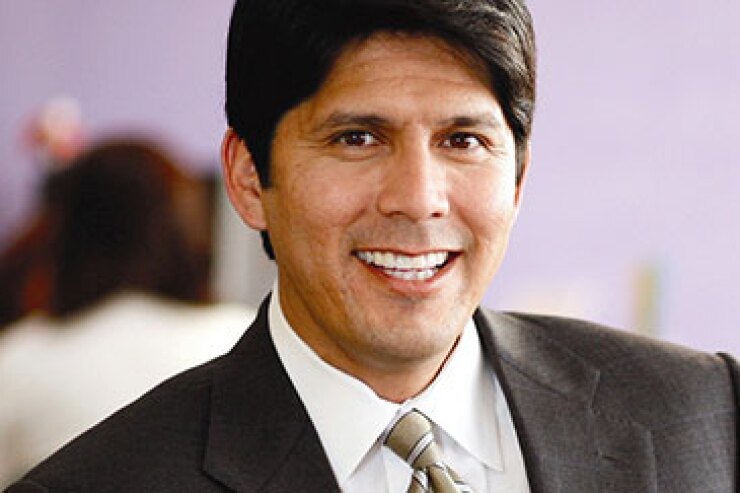
LOS ANGELES — California's gross domestic product has grown enough to earn it a ranking as the fifth largest economy in the world, but that distinction does not quiet critics who say the state has an anti-business climate.
A Milken Institute California Summit panel here Wednesday sought to explain why a state described in indexes and articles as having prohibitively high taxes and regulatory barriers that constrict growth and stifle job creation also has one of the fastest-growing economies.
The California economy grew 4.1% last year, nearly double the national rate, and the state has one of the best records for job growth, according to the panel.
It also has a large unfunded pension liability and an unhealthy dependence on a highly cyclical tax structure, said moderator Scott Minerd, a managing partner with Guggenheim Partners.
"It is no secret the California economy faces many challenges," Minerd said. "We have made progress, but we have a lot ahead of us."
The state's Department of Finance released
Kevin de Leon, president pro tempore of the California Senate, said today we are the "fifth" largest economy in the world in GDP, having just recently surpassed the United Kingdom largely because of Brexit.
The state government's tax revenues are dominated by personal income taxes and a high percentage of taxpayers with income derived by capital gains, which tends to rise and fall with the stock market. A frequent criticism of the state is the volatility in its tax structure, because of this construct.
"The top one-percent of income taxpayers pay 41% of income tax," said S&P Global Ratings analyst Gabriel Petek. "That makes for a volatile structure. It makes it tough for the state to weather its ups and downs."
California's unfunded pension liability of 70% is roughly average, Petek said, but retiree health benefits, or other-post employment benefits, are also a concern. The state allocates $2 billion annually for OPEB, but Petek said lawmakers should be putting in $6 billion annually.
De Leon disputed the notion that California's business climate is hurting its ability to generate jobs.
"I think we are the fifth largest economy not by pure luck, but by not allowing global factors to sort of dictate what happens in California," de Leon said. "We have moved public policies. We are not just a leader in jobs, but the leader in the world, whether it is renewable energy or biosciences."
California has eight of the top 20 bioscience graduate school programs in the country, de Leon said.
"Our job growth is larger than the next two leading states – Texas and Florida – combined," de Leon said. "In August, the state created 40% of all the jobs in the U.S."
U.S. Rep. Mimi Walters, an Orange County Republican, argued the state and the country do need to reduce regulation, which she said is harming business. She said the state has lost a quarter million people and has no manufacturing.
De Leon acknowledged the state still has challenges, but one is not the state legislature and governor's ability to work together to get things done; which he added is not the case at the federal level.
"Our credit rating is not robust, but it has improved relative to other states," De Leon said.
The S&P rating was an A-minus in 2011 when Gov. Jerry Brown took office, but it has moved up to AA-minus, Petek said.
"At the same time, the rating is still lower than 41 other states," Petek said. "We still see a lot of vulnerabilities in work on the state's credit."
When de Leon talks about the amiable nature of the state legislature, that did not use to be the case, said Petek. In 2010, the state did not pass a budget until Oct. 8, he said.
The voter approval of Proposition 25 in 2010 helped by enabling the state to pass a budget with a simple majority, rather than a two-thirds vote, Petek said. Changes to term limits and top two priority voting also helped ease gridlock in Sacramento, but the changes are not enough to smooth out the fiscal stress, he said.





